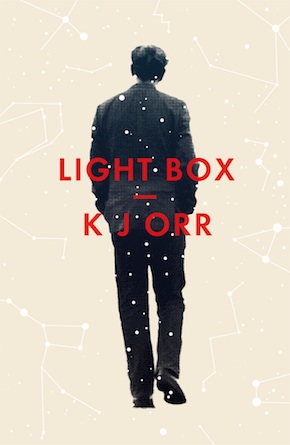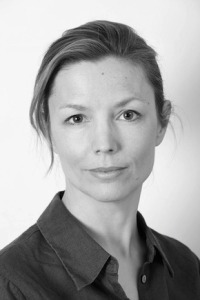Putting the pieces together
by K J Orr
“A luminous collection. It reveals, with beautiful acuity, what it is to be human, tender and fallible.” Alison MacLeod
K J Orr’s short fiction has won the Dan Hemingway Prize and a Bridport Prize, been Pushcart Prize nominated, and shortlisted for awards including the BBC National Short Story Award, the Asham Award, the London Short Story Prize and the KWS Hilary Mantel International Short Story Prize. Her debut collection Light Box is out now from Daunt Books.
Where are you now?
I’m in London.
Where and when do you do most of your writing?
The where varies a good deal: so much writing takes place away from the desk, with mulling, note-making, walking, travelling. At home now, for drafting, I alternate between a sitting desk and a standing desk where I am able to spread things out. I like to write new material first thing if I can, so that I’m somewhere between dreaming and waking. I’m not alone in this. Kevin Barry quoted Don DeLillo’s “still a little puddled in dream melt” in an interview not long ago: I love it as an evocation of that feeling.
If you have one, what is your pre-writing ritual?
This is the best: roll out of bed, make coffee, write. Leave phone on silent. Shower later. Check email later. If I stick to this I am much more productive: I don’t always stick to this. But a different state of mind kicks into action once I start to engage with things like email.
Full-time or part-time?
When I first decided I wanted to get serious about writing, I was managing a bookstore and writing had to fit around the edges. But I have been lucky since then with being awarded some funding for my work. I consider myself spectacularly fortunate for the space that has given me to write. Now I am starting to spend more time teaching: but I love it.
Pen or keyboard?
I write a lot of notes, often in a barely decipherable scrawl, and almost always on scraps of paper that float about my person. A woman sitting next to me at an event recently insisted on giving me a proper sheet of paper – which was kind. But I seem to prefer the scraps of paper. My theory about this is that I get tremendous pleasure from the rediscovery of fragments – which involves some effort… the tiny pieces of paper, the hard-to-decipher scrawl. Somehow through all this I find my way back to the thought or piece of prose or dialogue in question, and with a feeling of freshness that I don’t get if I write everything down in an ordered fashion. I respond to the obfuscation: it gives me something to work at. With focused drafting, which is a different stage, I use a keyboard. And then I edit on paper.
How do you relax when you’re writing?
If I’m really focused on writing when I’m writing then that’s a pretty good form of relaxation for me. Those who know me well would tell you that I get much scratchier when I’ve not been writing. But walking is good… I associate it with holding ideas lightly and seeing where they take me. Getting away from the desk can be so much more productive than just sitting there willing progress to happen.
How would you pitch your latest book in up to 25 words?
It explores the way change can break into people’s lives and challenge their understanding of their place in the world, their narrative, sense of reality.
Who do you write for?
I would hope my stories are for anyone who loves to read – the themes I explore in Light Box are universals: love, grief, guilt, shock and disorientation in the face of change, and the deep need for human connection. I’m definitely drawn to writing about moments of transformation in people’s lives – the ways they respond. I’m drawn too to the ways we try to create order in our lives in the face of everything that is unknown or chaotic or messed-up. While I’m writing I think more about making any piece work on its own terms, but what I write is undoubtedly connected to the way I read and to what I love to read. I love short stories because they tend to leave a certain space for the reader – space the reader gets to step into. I treasure this, myself, in any reading experience.
Who do you share your work in progress with?
I think there is some truth in the advice I was given by another writer a few years ago: you don’t want more than two readers you really trust. But putting a collection together over several years, and sending individual stories out for publication along the way, has meant sharing my work with many more than two readers. I have been lucky enough to have had some exceptional readers: some are writers, some are editors, and some are neither.
Which literary character do you wish you created?
Atticus Finch has stayed with me over the years especially for that call to our better angels: “You never really understand a person until you consider things from his point of view… until you climb into his skin and walk around in it.” As a writer you are constantly presuming to make these acts of extension, imagining other people’s lives, and you can worry about that presumption – about not doing it well enough, or not having the right. But those words give me courage in spite of the risks – courage to believe in the worth of the attempt.
Share with us your favourite line/s of dialogue, poetry or prose.
Those scraps of paper I was talking about… they are filled with these. But here’s one I have above my desk: “… the first creatures on earth to become aware of time were also the first creatures to smile” (Vladimir Nabokov: Speak, Memory).
Which book do you wish you’d written?
Isn’t that like wishing you were someone else? For better or worse you hope to write books that only you could write.
Which book/s have you most recently read and enjoyed?
Pond by Claire-Louise Bennett.
What’s on your bedside table or e-reader?
Lucia Berlin’s A Manual for Cleaning Women. The Folio collection of Chekhov’s short stories. Between the World and Me by Ta-Nehisi Coates.
Which books do you feel you ought to have read but haven’t yet?
That’s not how I think of reading – it’s much more about following my interest and curiosity at any particular time… the circuitous pathway, the unexpected discovery.
Which book/s do you treasure the most?
Childhood books that take me back to the very beginning of reading and writing. Books I have been given in life by those I love. Certain books I read in my early twenties that made me fall in love with literature all over again and that fuelled my desire to write – that made me understand how important writing could be for me and for my sense of purpose in life.
What is the last work you read in translation?
I am reading Life of a Counterfeiter by Yasushi Inoue, translated by Michael Emmerich.
Which story collections would you particularly recommend?
We could be here a long time! But here are two: David Means’ Assorted Fire Events. Mary Costello’s The China Factory.
What will you read next?
I’m reading a good deal on the human brain for my next book.
What are you working on next?
More fiction: it has to do with neuroscience and photography.
Imagine you’re the host of a literary supper, who would your dinner guests be (living or dead, real or fictional)?
Impossible question! I’d want a different combination every night of the week. They might have to be screened for cookery skills though, because I’m not an amazing cook. I could set them all to work. Or else a road trip for the weekend – that would be interesting because there’s a pressure cooker of shared space and enough time for dynamics to start to kick in. I’m sure I heard an anecdote once about Raymond Carver, Angela Carter and someone else amazing all crammed into a tiny Mini and heading off on to the open road after an event…
If you weren’t writing you’d be…?
Sketching: I have no skills in this direction, but I have a love of sketches. As with short stories what’s left out seems as important as what goes in. There is space for the imagination.
 K J Orr was born in London. Her short fiction has been broadcast on BBC Radio 4 and published by the Dublin Review, the White Review, The Sunday Times Magazine, Lighthouse and Comma Press, among others. Light Box is published by Daunt Books.
K J Orr was born in London. Her short fiction has been broadcast on BBC Radio 4 and published by the Dublin Review, the White Review, The Sunday Times Magazine, Lighthouse and Comma Press, among others. Light Box is published by Daunt Books.
Read more.
kjorr.com
Author portrait © Lottie Davis

